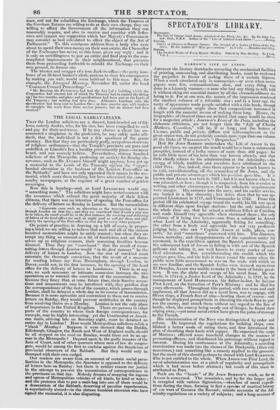THE LEGAL SABBATARIANS.
THAT the London solicitors are a shrewd, hard:headed set of fel- lows, nobody doubts, who, for his sins, has been compelled to seek
• and pay for their assistance. If by any chance a client has en- countered a simpleton in the profession, he may safely make affi- davit, that the individual is not a fair specimen of the genus attorney. But that they are particularly godly, scrupulous observers of religious ordinances—that the Temple's precincts arc pure and undefiled, or Lincoln's Inn a locality pre0mmently pious—we never heard, and can scarcely believe. Nevertheless, sixteen hundred solicitors of the Metropolis, professing an anxiety for Sunday ob- servance, such as Sir Aximew himself might approve, have got up a memorial to the Lords of the Treasury against the " appre- hended alteration in the business of the London Post-office on the Sabbath ;" and have not only appended their names to the me- morial, which costs them nothing, but have advertised the same in sundry newspapers, at the expense of a great number of golden sovereigns.
Now this is humbug—and, as Lord LYNDHURST would say, " something more." The solicitors might have rested content with the assurance which calmed the great majority of their fellow citizens, that there was no intention of opening the Post-office for the delivery of letters on Sunday in London. But the memorialists . . .
"deprecate even such an alteration as the transmission of letters through London on that day ; and they are convinced that if such a step was to be taken, the result would he; in the first instance, the receiving and deli replay of letters at the head offices for such as might send or call fiur them, and ulti- mately the opening of the Post-office on that day for every other purpose."
On points of practice, in drawing up a bill of costs, in prepar- ing a brief, we are willing to believe that each and all of? the sixteen hundred memorialists might be safely trusted ; but when they at- tempt any thing so unusual as a bit of fanaticism, and set them- selves up as religious censors, their reasoning fliculties become dimmed. Thus they are "convinced" that the result of trans- mitting letters through London would "in the first instance" be the delivery of letters in London. Now the rest of mankind must entertain the thorough conviction, that the result of a measure for sending letters say from Birmingham, through London, to Dover, could not, in the first instance, be the opening of the head office for the delivery of letters to Londoners. There is, at any rate, no such necessary or intimate connexion between the two operations as to warrant the conviction of the memorialists. But because they fancy that, at some future time, their Sunday avoca- tions and amusements may be interfered with, they petition that the correspondence of the rest of the country, which passes through London, shall be delayed a whole day in its course of transmission. Because it is more agreeable and convenient to them not to receive letters on Sunday, they would prevent multitudes in the country from receiving theirs on a Monday. London is not the only place of importance in the United Kingdom. There are persons in other parts of the country to whom their foreign correspondence, for example, may be highly interesting: yet the Continental or Ameri- can mails, arriving late on Saturday night, must be detained an entire day in London ! how would Metropolitan solicitors relish a " blank ' Monday ? Suppose it were decreed that the Dublin, Edinburgh, Glasgow, the North and West of England mails, should be all stopped on the road on Sunday, would there not be an up- roar in the Metropolis ? Depend upon it, the godly inmates of the Inns of Court, and of other quarters where men of law do congre- gate, would be among the first to exclaim against the fanaticism of provincial observers of the Sabbath. But they would only be thumped with their own cudgel.
Our readers are aware that, on account of certain social pecu-
liarities in the Metropolis, the Spectator is opposed to the delivery • of letters here on Sunday : but there is neither reason nor justice in the attempt to prevent the transmission of correspondence to
the provinces on that day. Nobody dreams of stopping the ingress
and egress of Metropolitan vehicles of all kinds, by land or water ; and the pretence that to put a mail-bag into one of them would be a desecration of the Sabbath, deserving of peculiar reprehension, is superlatively absurd—in the sixteen hundred attornics who have signed the memorial, it is also disgusting.


























 Previous page
Previous page